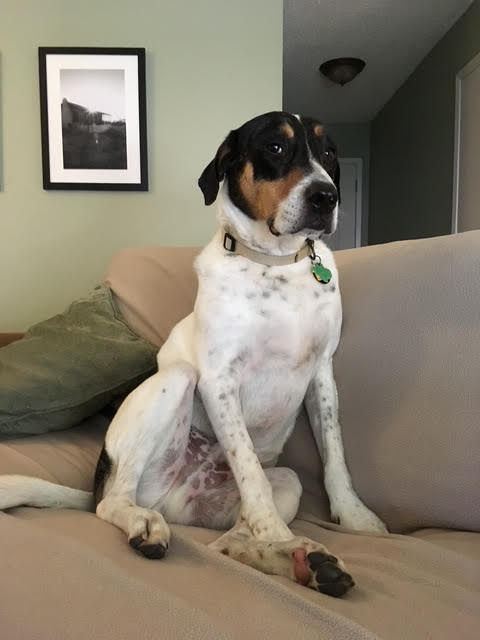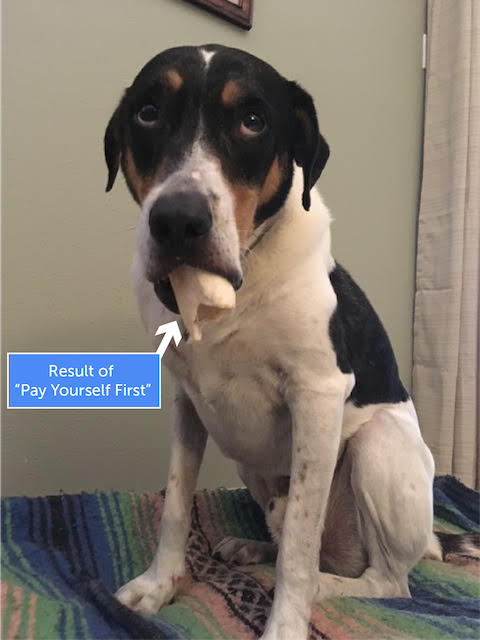October 31, 2025
I’ve decided to take a momentary detour from my usual content. My past newsletters have spent a lot of time on academic work in finance, portfolio theory, and risk; hardly party material. If you have read them, thank you, but I think it is time to write about something lighthearted, less stuffy, and hopefully more entertaining. Since this is a finance newsletter, it will relate, admittedly loosely, to a concept we call “Pay Yourself First.” This one is about my now deceased dog, Otis.
Otis was a barrel-chested hound mix. I got him from the City of Austin municipal animal shelter. If you’ve ever seen such a place, you know it’s kind of like a prison. They do their best and do a great service getting dogs adopted, but the shelter has that institutional, drab, utilitarian kind of feel to it, complete with cinderblock and chain-link kennels. Not exactly a fun place. Years ago, when I was walking around surveying available dogs, I immediately locked onto one who was acting quite different. This sad sack was not jumping on the fence, barking, or doing the usual song and dance for attention; he was simply leaning against the back wall with his head hanging down, but with a calm “it is what it is” resignation to him. So, that’s all I needed to see to know I was taking Otis home.
In a long line of dogs in my life, who are all special in their own way, I’d say Otis was uniquely special. He was easily the most trainable and self-disciplined dog I’ve ever had. A true soldier and total knucklehead.
Otis was so trainable that he reached a level where I could leave a steak dinner on the coffee table, go out front to get the mail, and come back in with it totally untouched. He’d just be sitting calmly on his bed. This took some careful practice and other juicy rewards, but his extraordinary restraint made it possible.
When I first got him, if I would be away for long stretches, I would put Otis out back and leave him with a choice bone or piece of rawhide. When I would return, the treats would be gone, and I never paid much attention to what happened to them, assuming he had, like most dogs, destroyed them as fast as he could.
After many weeks of this, I decided to lay off the routine, feeling like he was getting spoiled. So, several weeks went by with no dog bones or rawhide to tide him over. One day I was out back doing yard work, and I detected the distinct smell of fresh dirt and heard a strange noise. I went back to the porch and saw Otis chomping on a filthy piece of rawhide. Amused, I realized he had been squirreling them away for whenever his good fortune ran out. I walked around the yard and, in a carefully planned spot near where the fence connected to the house, spotted a fresh mound of dirt next to a large hole. I was laughing when I saw about thirty remaining bones and rawhide pieces cached away for the future.
Otis had mastered the art of “Pay Yourself First.” He had deferred immediate gratification for a bigger payoff later in what I consider an extraordinary show of discipline and restraint. I imagine his less-than-ideal past experiences had engendered this instinct.
We call making steady contributions to your accounts “Pay Yourself First,” because that is in fact what you are doing. You are reallocating spending and consumption now to investments that are intended to provide more for you later. Paying yourself first also has some nice efficiencies to it. For every dollar you save, you have a dollar. For every dollar you try to earn, you only receive a portion. If you can do so, when tackling all the expenses you pay for today, at the very least, pay yourself first. Your future self will thank you.
We don’t need to be Pay Yourself First robots, devoid of any fun today, but once you develop the habit, it really sticks with you in a good way. Everyone knows saving is smart, but it’s the discipline to actually do it that makes the difference. Having a membership to a gym with all the fanciest amenities doesn’t improve your fitness if you aren’t walking in the door a few times a week. The idea is useless without the action.
But we ought to have some fun too; we are human (or dogs) after all. One day, after dinner, I walked out to check the mail. I love Pepperidge Farm Milano cookies and had left a few on a small plate on the coffee table.1 I came back in and immediately sensed something was off. I heard a subtle gum-smacking noise, but in a way where you could tell it was trying to be concealed. I looked over at Otis, who was sitting on his bed, head hanging low, and doing that funny side-eye look dogs do when something is up. I looked over at the coffee table, and my Pepperidge Farm Milano cookies were gone.
The master of deferred gratification discipline, who had triumphed for years in the presence of steak, enchiladas, and barbeque, had cracked over a plate of cookies. I couldn’t be mad; we all have our weaknesses. He was the best, still is, and if we all try to be like Otis, then our future selves will no doubt be better off.
- John Bass
1. I have no affiliation with Pepperidge Farm, nor do I get paid to endorse their cookies. But they are darn good.

